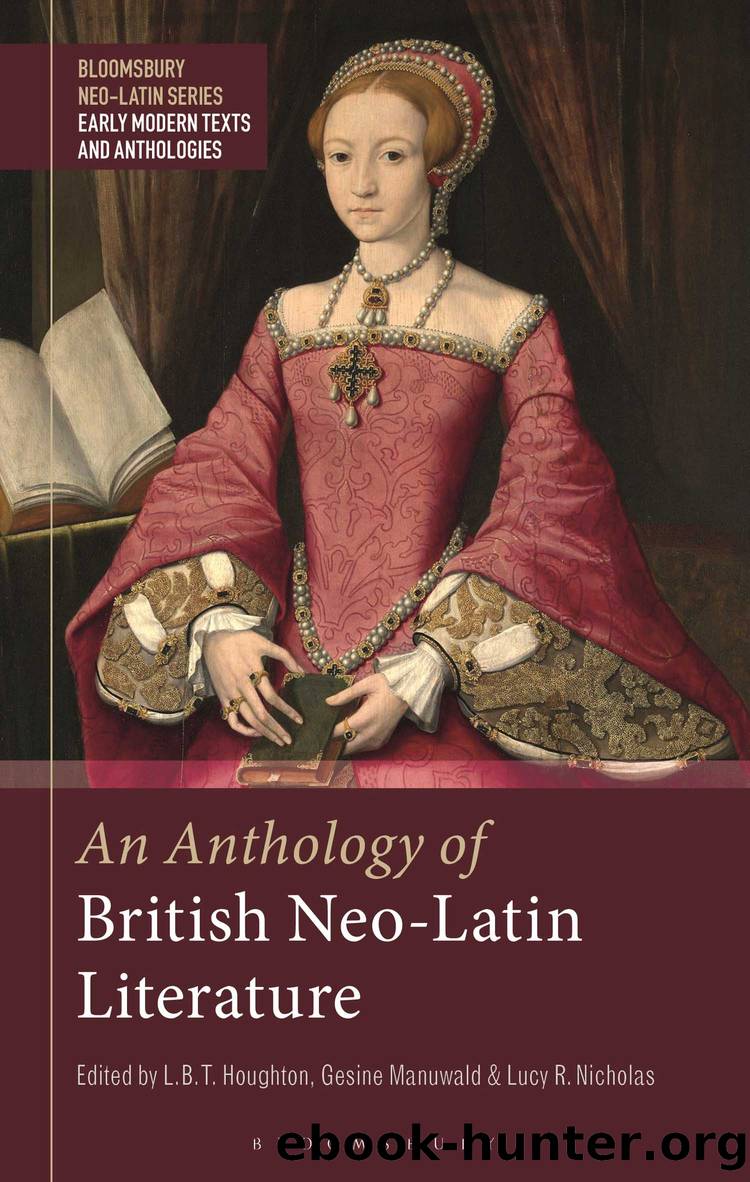An Anthology of British Neo-Latin Literature by Gesine Manuwald;L. B. T. Houghton;Lucy R. Nicholas;

Author:Gesine Manuwald;L. B. T. Houghton;Lucy R. Nicholas;
Language: eng
Format: epub
ISBN: 9781350098909
Publisher: Bloomsbury UK
Published: 2020-07-19T00:00:00+00:00
10
A Comic Exorcism
George Ruggle (1575â c. 1622), Ignoramus IV 11 (Excerpt)
Daniel Hadas
Introduction
George Ruggle was baptized on 3 November 1575 in Lavenham, Suffolk. In 1589 he matriculated at St Johnâs College, Cambridge. In 1593 he became a scholar of Trinity College, Cambridge, graduating BA the same year and MA in 1597. In 1598 he was elected a fellow of Clare College, where he remained until 1620, probably dying shortly after. We possess few other details of his life, and no works other than Ignoramus are attributed to him. Ignoramus is a Latin comedy in five acts, in the classicizing tradition of university dramas (on this tradition in England, see Boas 1914). It was written for the 1615 royal visitation of James I to Cambridge and performed at Trinity College, before the king, by students and fellows of the university, on 8 March 1615. The performance lasted over five hours. James was greatly taken by the play and returned to Cambridge on 13 May 1615 to have it performed again (for Ruggle and his play, see Ruggleâs DNB entry; Sutton 2014; and above all Hawkins 1787).
Ignoramus is a loose adaptation of the Trappolaria (1596) of the Neapolitan polymath Giambattista della Porta, itself inspired by Plautusâ Pseudolus. The plot is complex, but its core is the successful attempt by the young hero Antonius to extract his beloved, Rosabella, from the clutches of the English lawyer Ignoramus, to whom she has been betrothed by her guardian, the pimp Torcol. The play is set in contemporary Bordeaux; so, while the bulk of the dialogue is in Latin, the audience is meant to imagine that this Latin is French. Characters repeatedly refer to Latin as if it were French, whereas, when they speak English or Portuguese, dialogue is rendered in those languages, not in Latin.
The lawyer Ignoramus is the source of much of the playâs comedy (for other contemporary plays targeting lawyers, see Tucker 1977: xxxiiiâxxxvi). He is a stock figure, the lustful old fool led a merry dance by the young lovers. But comedy comes above all from Ignoramusâ use of Latin, a use that in turn forms the basis of a savage parody by Ruggle of the language of English Common Law (see Tucker 1977). On the Continent, lawyers studied the Roman law of antiquity and had joined in the humanist project to write a classicizing Latin. But English lawyers had remained faithful to the islandâs medieval Common Law tradition (see Maitland 1901). Legal procedure was carried out, and legal documents were written, in highly anglicized forms of French (âLaw Frenchâ) and of Latin (see Baker 1998). Thus Ignoramus mostly speaks a grotesquely non-classical Latin. Within the playâs linguistic universe, as Latin stands in for French, he is probably to be imagined as attempting to speak Law French in France â an intrinsically ludicrous enterprise. He is also law-crazed, so that all his dialogue is permeated with legal technicalities.
Ignoramus was well targeted to delight its audience. Cambridge and Oxford students were taught to write
Download
This site does not store any files on its server. We only index and link to content provided by other sites. Please contact the content providers to delete copyright contents if any and email us, we'll remove relevant links or contents immediately.
Love Your Life by Sophie Kinsella(1168)
Albion by Peter Ackroyd(1013)
The Hell of it All by Charlie Brooker(873)
How To Be A Woman by Caitlin Moran(811)
Albion: The Origins of the English Imagination by Peter Ackroyd(795)
All in a Don's Day by Mary Beard(760)
A Dictionary of Literary Symbols by Michael Ferber(751)
The Eye in the Triangle: An Interpretation of Aleister Crowley by Israel Regardie(732)
Protector by Conn Iggulden(716)
English Literature: A Very Short Introduction by Jonathan Bate(686)
Dot Con by James Veitch(676)
Less: Winner of the Pulitzer Prize for Fiction 2018 by Andrew Sean Greer(619)
English Literature: A Very Short Introduction (Very Short Introductions) by Bate Jonathan(570)
I, Partridge by Alan Partridge(551)
Katharine Parr, the Sixth Wife by Alison Weir(528)
The Cambridge Introduction to Jane Austen (Cambridge Introductions to Literature) by Janet Todd(510)
Work! Consume! Die! by Boyle Frankie(509)
Mussolini: His Part in My Downfall by Spike Milligan(509)
Sir Gawain and the Green Knight; Pearl; by J. R. R. Tolkien(500)
